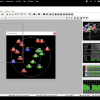As we begin focusing some of our efforts on the classroom, I wanted to offer some free content that is easily usable by teachers and digestible by students. In that same vein, I wanted to make it short and sweet so it can be injected into a class or consumed by the curious mind.
Over the next few weeks, I'll be releasing a series of videos that cover the basics of electricity and electronics. I hope that they act as a tie-in to introductory circuits lessons found in many physics classes. I realize that many of you who frequent this blog already have a solid grasp of the basics, so I am looking for feedback from those of you who already know this stuff: What worked? What could have been explained better? What would you have done differently when describing how electricity works?
Why a concept video? It turns out that some of the most popular pages on our site are the introductory electronics tutorials that cover topics like What is Electricity? and Ohm's Law. As I worked my way through the written guides, I wanted to turn them into 5--10 minute video summaries. The first video, "What is Voltage?", found most of its inspiration from Jimb0's "What is Electricity?" guide:
What is Electricity?
June 13, 2013
We can see electricity in action on our computers, lighting our houses, as lightning strikes in thunderstorms, but what is it? This is not an easy question, but this tutorial will shed some light on it!
Interested in learning more foundational topics?
See our Engineering Essentials page for a full list of cornerstone topics surrounding electrical engineering.








Laser printing is a really cool example of using static electricity.
Cathodic protection on pipelines is another cool use of electricity for environmental protection.
This was an incredibly informative video and, as a fourth grade teacher, I am excited to have resources that deepen my own knowledge. However, there is the pressing issue of that lab coat. Where can we get one!?
Thank you! And sadly, the lab coat has long since been retired from our catalog. However, you can find them any uniform store or even Amazon
Maybe contact this guy:
https://www.youtube.com/watch?v=sFGb7NlUvgg
https://www.youtube.com/watch?v=JST8NHoAAcA
https://www.youtube.com/watch?v=hPNMoalTTVE
For me the big thing is learning what not to explain of what I taught and shown, and having cosmology examples of the for things we see in electronics.